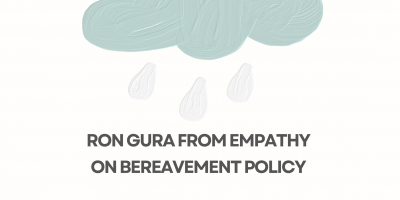
Christine M. Cooper from aequum on Reference-Based Pricing
Can Reference-Based Pricing (RBP) shed light on the opaque landscape of healthcare costs?

The passing of a loved one is one of the hardest things any of us will endure.
The loss experience goes far beyond the emotional toll it takes — it is often compounded by the legal, financial, and bureaucratic responsibilities that families must deal with for months, even years.
US employees who experience loss, however, are typically granted no more than five days of bereavement leave. That is, simply put, not enough.
In addition, employees need far more support from their employers than just time off.
According to a survey our company conducted to assess the actual cost of dying, grieving employees spend an average of 420 hours over 13 months settling a loved one’s affairs, all while juggling a full-time job. Their work performance often suffers, as well as their health – 93% experience at least one mental or physical symptom during such periods.
Despite recent pushes for extended leave, comprehensive bereavement care is still overwhelmingly missing from employee benefits packages. Even for the most progressive employers, supporting employees dealing with loss has been a difficult challenge to solve.
But it doesn’t have to be as hard as it is.
Employers can improve employee well-being during the darkest days of their lives with a holistic, human-centered approach while reducing the risk of productivity issues, morale problems, and potential burnout and turnover.
Below are a few strategies companies can adopt to offer more comprehensive bereavement benefits and support their employees during such challenging periodsp.

There is no federal guarantee of bereavement leave for workers in the US. But in the past ten years, five states have enacted their own bereavement laws, and three more have legislation pending.
At the same time, many companies are expanding their bereavement policies. Recent research revealed that some 35% of companies have either expanded their definition of bereavement care over the past 12 months or plan to do so in the coming year.
But offering extended bereavement leave is only the beginning – companies have many more opportunities to elevate the well-being of their workforce, both emotionally and logistically.
Often marked by stressful days and sleepless nights, grief is a 24/7 experience and should be treated as such. Companies can provide employees with access to on-demand grief support by connecting them with certified grief counselors, dedicated Care Managers, and resources like supportive audiobooks and guided meditation sessions to help them cope with the pain, confusion, and isolation of loss.
On the practical side, grieving employees can spend as much as 18 months or more managing their loved one’s estate – mainly if they serve as executors. Going through this assortment of bureaucratic tasks while mourning can quickly overwhelm anyone, even the most conscientious, productive employees.
Employers can avoid this potential burnout by offering services that help employees complete grueling tasks, including closing their loved ones’ bank and social media accounts.
Even if an organization lacks the resources to provide such a range of support, they can help save their employees time and unwanted stress by curating a list of service providers for them – essential services including childcare, meal delivery services, estate and probate lawyers, and local therapists, among many others.

In 2022, over 8 million workers across the US took unpaid time off to care for a friend or non-immediate family member, underscoring the pressing need for bereavement policies that accommodate relationships outside of the nuclear family.
Bereavement policies must be highly adaptable and encompass a broad spectrum of loss, including miscarriage and pregnancy loss, to be inclusive and equitable for all.
One out of four pregnancies result in miscarriages, yet this reality remains under-addressed in many employee benefits. Given the immense emotional and physical toll it can take on women, bereavement benefits should be malleable enough to accommodate their grieving needs accordingly.
Furthermore, as organizations increasingly prioritize their DEI+B – diversity, equity, inclusivity, and belonging goals – employers should broaden their policies to embrace employees’ cultural and religious customs surrounding funeral and grief rituals that may involve extended family and the need for additional time off.

Offering employees genuine support during one of the most challenging periods in their lives – both in and outside the workplace – creates a “new normal” and an authentic culture of care in the modern workplace.
Employers who embrace the opportunity to deal directly with their bereaved employees’ burden can usher in a transformative era of holistic bereavement policies.
At the same time, they will also set a precedent for other organizations while lowering turnover and improving employee well-being, productivity, and overall workplace environment.
These are more than just acts of compassion. Thus, it is essential to undertake a comprehensive overhaul of bereavement care to help employees get back on their feet, not just back at their desks.

Co-Founder and CEO of Empathy
Browse our curated list of vendors to find the best solution for your needs.
Subscribe to our newsletter for the latest trends, expert tips, and workplace insights!

Can Reference-Based Pricing (RBP) shed light on the opaque landscape of healthcare costs?

What strategies can companies adopt to offer more comprehensive bereavement policies and benefits to support their employees during challenging periods?

Employees facing a toxic work environment often find themselves in challenging situations, but there are constructive steps they can take to address the issue.

Family-forming benefits are not just about reproductive health – they are about creating an equitable environment where every employee feels safe, valued, and supported.
Shortlister Connect is a tool specifically designed to be utilized by the HR and Procurement/Sourcing teams within mid-size, large and jumbo employers. Shortlister Connect allows these teams to efficiently research & identify their optimal vendor partners, track existing vendor relationships & performance and “connect” with other employers to share successes and vendor experiences.
If you are not on the HR or Procurement/Sourcing team within an employer with over 200 employees, you will not be granted access to Connect. Examples of individuals that would not be granted access include, but are not limited to: vendors, students, practitioners, researchers, other non-employers or anyone that is unwilling to identify themselves will not pass our vetting criteria. If you are a consultant, Shortlister offers a specialized product for consultants, called Shortlister Select. You can email Tom Ciccotti at tciccotti@myshortlister.com to learn more about Shortlister Select.
***Shortlister retains the exclusive right to grant or deny access to any party to ensure the privacy of the vendors in our system.
Please login with your LinkedIn Credentials
Used by most of the top employee benefits consultants in the US, Shortlister is where you can find, research and select HR and benefits vendors for your clients.
Shortlister helps you reach your ideal prospects. Claim your free account to control your message and receive employer, consultant and health plan leads.